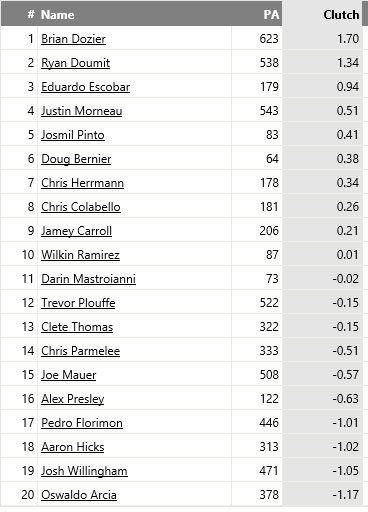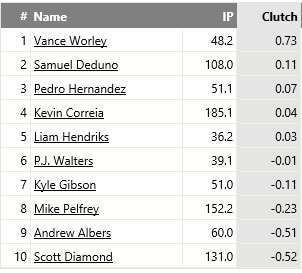"Clutch" is a word that has been used to describe the players who go above and beyond the norm and perform highly in difficult situations in close games: The guy who comes into the game with 2 outs and the bases loaded, down three in the bottom of the ninth and hits a grand slam off a closer who never blew a save. The pitcher who comes in with bases loaded and no outs, up one on the bottom of the ninth and strikes out the side to save the game. Whether or not there are players out there who are "clutch" and consistently outperform themselves in those type of situations has been a vast subject of debate. Here is a good summary of a few historic studies and here is a list of lots of links on the subject, if you feel like reading more.
About 5 years ago, David Appelman devised a measurement called, well, "Clutch" that tries to describe clutch hitting and pitching. Basically what it does, is it looks at the difference of someone's performance (based on Win Probability Added) in High Leverage situations only, versus his overall performance. Players with positive Clutch outperform their overall performance in those situations and players with negative Clutch underperform. This does not mean that a player with a higher Clutch is a "better" player than one with lower Clutch. If someone hits .220 with the bases loaded and .200 overall, is not a better player than someone who hits .320 with the bases loaded and .340 overall, despite the Clutch numbers.
Fangraphs picked the stat now and I sorted the Twins hitters, relief pitchers and starting pitchers based on Clutch. This is an exercise just for fun. I don't think that it means that much (see example above), but it is interesting and it potentially be an additional tool for player evaluation, but not a stand alone tool. Situational and High Leverage performance definitely might tell something about relievers as a group, but we are not about to jump into any conclusions here. Just a demo :)
Here are the 2013 Twins' hitters ranked by Clutch (60 PA min) :
Here are the 2013 Twins' relief pitchers ranked by Clutch (10 IP min):
Here are the 2013 Twins' starting pitchers ranked by Clutch (35 IP min):
Pitchers in both roles are listed on both tables for that role only. A couple of observations:
About 5 years ago, David Appelman devised a measurement called, well, "Clutch" that tries to describe clutch hitting and pitching. Basically what it does, is it looks at the difference of someone's performance (based on Win Probability Added) in High Leverage situations only, versus his overall performance. Players with positive Clutch outperform their overall performance in those situations and players with negative Clutch underperform. This does not mean that a player with a higher Clutch is a "better" player than one with lower Clutch. If someone hits .220 with the bases loaded and .200 overall, is not a better player than someone who hits .320 with the bases loaded and .340 overall, despite the Clutch numbers.
Fangraphs picked the stat now and I sorted the Twins hitters, relief pitchers and starting pitchers based on Clutch. This is an exercise just for fun. I don't think that it means that much (see example above), but it is interesting and it potentially be an additional tool for player evaluation, but not a stand alone tool. Situational and High Leverage performance definitely might tell something about relievers as a group, but we are not about to jump into any conclusions here. Just a demo :)
Here are the 2013 Twins' hitters ranked by Clutch (60 PA min) :
Here are the 2013 Twins' relief pitchers ranked by Clutch (10 IP min):
Here are the 2013 Twins' starting pitchers ranked by Clutch (35 IP min):
Pitchers in both roles are listed on both tables for that role only. A couple of observations:
- The Twins definitely do not use or value the metric, since about half of the players with positive Clutch numbers are gone
- I am not surprised to see Dozier and Duensing lead the hitter and the reliever groups respectively. It is my recollection that they really excelled in pressure situations
- Worley leading the starter group may be a surprise, until someone considers that, in order to pitch in a high leverage situation, a starter needs to get himself into trouble to make that situation high leverage. Thus, Clutch, is not very useful at all for starters (other than looking at fun results like the above...)








4 comments:
If you were to ask me who the top candidate to regress was, is say Dozier. Conversely I would bet Willingham and Hicks are prime candidates to bounce back. Interesting to see those names at the top and bottom of the Clutch list.
I would not disagree with this, other than I would add Plouffe's name on the bounce back list.
On the other hand, Thielbar and Fien are my prime candidates for regression as far as the pen goes and their Clutch numbers were not that great...
Good article.
I have 3 middle school kids in sports and have been trying to get them to understand 'clutch' or being comfortable in high leverage situations. Any thoughts on how to coach or teach it? Simple answer is that you are born with it I suppose, while must be a good way to improve it via coaching/teaching on the mental side of the game.
Over the years (guessing you agree), Gardy's attitude toward the Yankees doesn't help the 'clutch' nature of his players.
Thoughts?
Dealing well with stressful and high leverage situation, I think, is a psychological/mental attribute. I am sure that it is something that can be taught; I think that the military does that daily. On the other hand, it is one thing to be prepared to face tough situations, and another to be constantly successful. I don't think that there are players who are "clutch" year in and year out. Couple of examples above: Morneau had 0.91 Clutch (with the Twins and the Pirates) and Mauer -0.57. Their career Clutch numbers are 1.85 for Mauer (with 5 positive years and 5 negative) and -0.69 for Morneau with (with 6 positive years and 6 negative). So it is a number that varies a lot, other that for very rare players. Kirby is one of those with career 5.15 Clutch and 8/4 positive to negative seasons.
Post a Comment